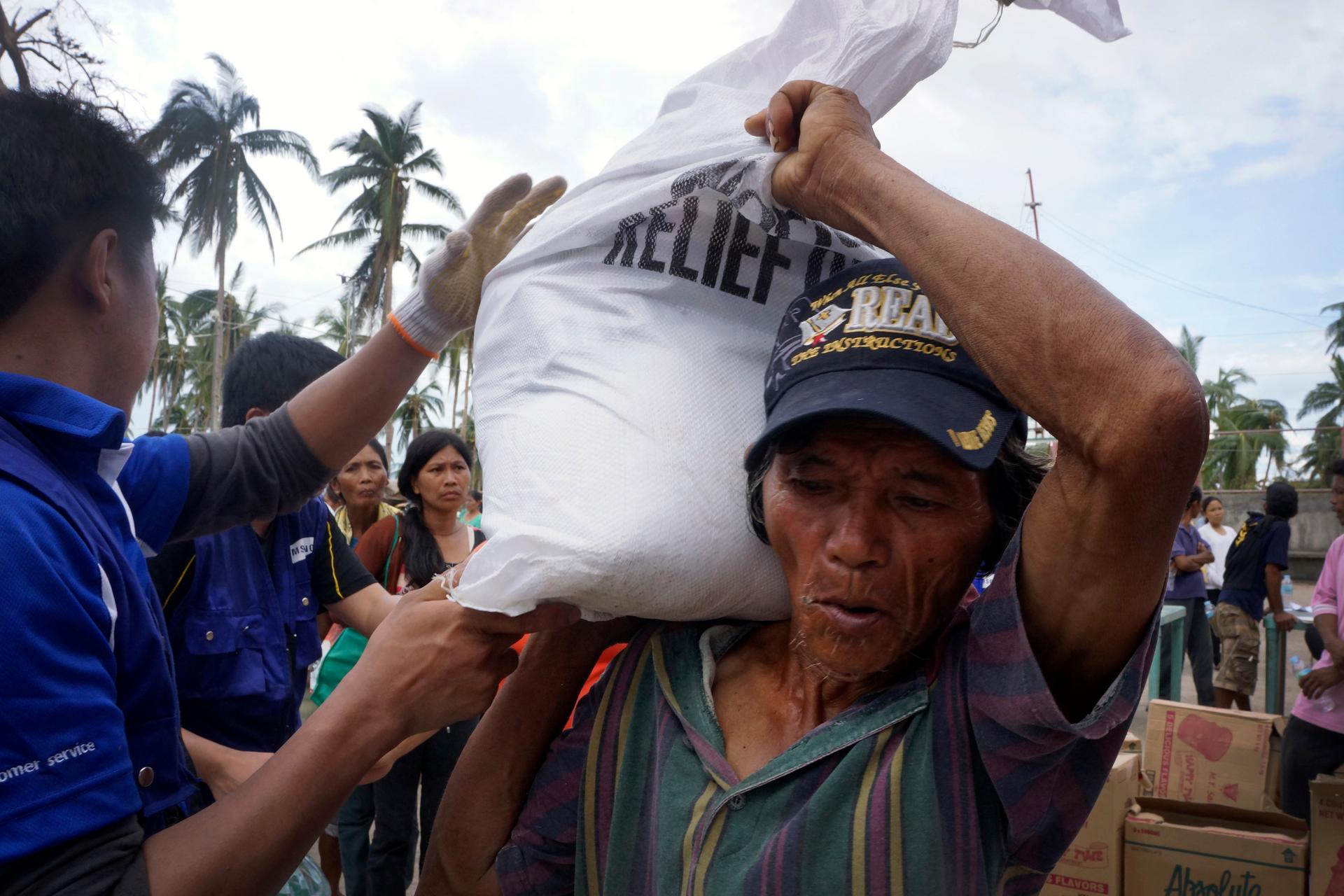US Filipinos throw a lifeline of cash to families struggling after the typhoon
Locals line up for aid from international charity World Vision in Typhoon Haiyan damaged Tabogon district, in northern Cebu on November 14, 2013.
For Bernadette Herrera and many others, it’s tough to be away from home, seeing on television how the recent typhoon has smashed the Philippines.
“It’s hard because the Filipino people now, you see on the TV, they’re asking help, they’re asking water, money,” she says.
I met Herrera at San Francisco’s Filipino Community Center. The Bay Area is home to one of the largest Filipino communities in the United States, and a relief drive was underway at the center.
Herrera’s family is safe. Though Kiko Carcellar is still waiting for word of his family. He’s from one of the areas hardest hit by Typhoon Haiyan.
“I have relatives living in downtown Tacloban,” Carcellar says. “I heard from two of them that two families are safe, but the others, they don’t know. Their faces flashed on me and now they are gone. Imagine. Flattened, flattened.”
Both Herrera and Carcellar say the disaster has put their obligations into focus. They are here to help raise funds, while also keeping up their other responsibility: earning and sending money to their families back home.
Carcellar has worked as a telecom field technician in the Bay Area for years, and he is still a major breadwinner for those back home. “Regularly, I spend for the education of my nephews and nieces and daughters and children of my co-workers.”
Herrera has worked as a caregiver and housecleaner. She scrapes together at least $1,000 to send home every month. The cash, she says, is spent on “food especially, that’s the basic. You know, the things that they need every day.” Her remittances also help pay for school tuition fees back home.
She’s one of at least 10 million Filipino expats working around the world. They are nannies, nurses, and other professionals in the US. The vast Filipino workforce is also spread throughout the Middle East, Europe, and parts of Asia. Most send money home.
This year, Filipino remittances are expected to total 26 billion dollars — and that was an estimate made before the typhoon.
Jay Gonzalez, a Philippines expert at the University of San Francisco, says that apart from remittances, assistance for families back home also comes in the form of care boxes. “They are very heavy, more than a hundred pounds,” says Gonzalez. “Filipinos fill them up with anything, anything from Costco, anything that comes from sales, canned goods, chocolates, clothes — even rice.”
But it's mainly cash that Filipinos abroad are now trying to raise for relief efforts.
Terrance Valen leads the National Alliance for Filipino Concerns. It is organizing fundraisers at the community center and across the US.
“Folks are looking for something they can trust, that they’re monetary donations are going directly to communities on the ground in the Philippines,” says Valen. “And that’s what we provide, as a grassroots relief operation that has partners, NGOs, schools and churches in the Philippines that we work with.”
If you ask people at the community center about collaborating with government agencies in the Philippines, people shake their heads. That’s all too corrupt, they say.
Herrera mentions a major scandal that is unfolding in the Philippines, where officials are accused of stealing millions in public funds. “They have big money but they are not using the money for the people,” she says.
Earlier this year, some expat Filipinos tried to organize a one-day moratorium on remittances as a way to flex their economic power and protest government corruption.
Gonzalez monitored the experiment. “Can you imagine a day where there’s no inflow of remittances to the Philippines? That would be a disaster,” he says.
So, did it work?
“No,” Gonzalez says, “because the problem with not sending remittances is that it has devastating effects to family. I will receive text messages from my mom and my dad if I don’t send my remittance. It’s a lifeline.”
Herrera says she’s about to send her regular monthly remittance, and now plans to find a way to squeeze even more out of her earnings to help her country rebuild.
There is no paywall on the story you just read because a community of dedicated listeners and readers have contributed to keep the global news you rely on free and accessible for all. Will you join the 319 donors who have supported The World so far? From now until Dec. 31, your gift will help us unlock a $67,000 match. Donate today to double your impact!
